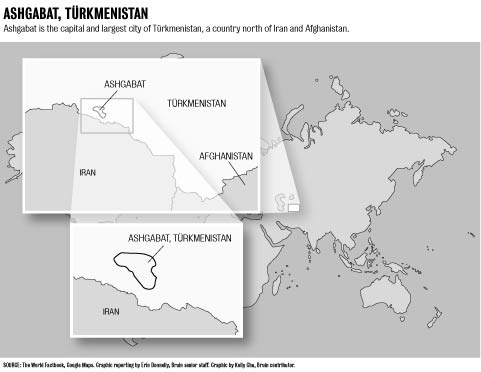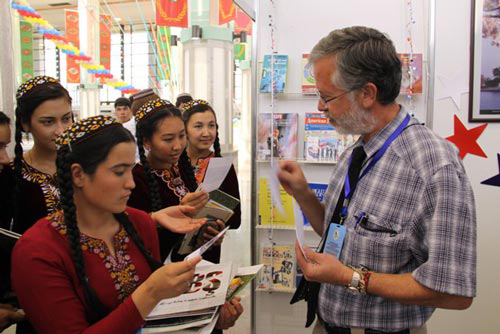
His well-kept office is filled with gifts and souvenirs that make it clear just how many places John Richardson has visited ““ a German flag hanging over his filing cabinet, a poster on “How to Read a Book” propped in front of his computer screen, a miniature camel from Turkmenistan caravanning across his bookshelf. And each prop has a history, catalogued by Richardson ““ that’s his gig.
“I’m supposed to know how to know,” he said.
Richardson, a professor of information studies at the UCLA Graduate School of Education and Information Studies, travels around the world as an expert on libraries.
This past summer, Richardson spent six weeks as a Fulbright Scholar in Turkmenistan, which borders Iran and Afghanistan. He studied the Central Asian country’s information economy ““ how people access and pass on information.
“When people have questions, how do they get their questions answered?” Richardson said.
He gave lectures to Turkmen librarians and scholars on modern research methodologies, such as how to properly use Google. Many who work in the region in the field of information studies are unfamiliar with the resources available online because of restrictions in place by the government, Richardson said. One of his focuses on this trip was to discuss the advantages of electronic books.
As of 2010, the National Library of Turkmenistan had no online presence and Internet use remains tightly controlled throughout the nation, according to the OpenNet Initiative.
Last summer marked Richardson’s fourth time back in the country, though his previous visits were shorter.
In 2011, he flew over as a guest of the Turkmen government during its annual International Book Fair, which brings in publishers and authors from all over Europe.ÂÂ
This year, he was invited back to the country by the United States government through the Fulbright Scholar Program.
Courtney Doggart, a cultural affairs officer at the U.S. Embassy in Ashgabat, Turkmenistan’s capital, was integral in bringing Richardson back to Central Asia.
“He’s been here in the past and we’re trying to build long-lasting connections,” Doggart said. “He’s able to connect with the people in a way the embassy can’t.”
During his most recent trip, Richardson’s task was to study the information economy and to advise the Turkmen government on how to rebuild its library systems.
President for Life Saparmurat Niyazov closed many of the nation’s libraries while maintaining a strict isolationist policy until his sudden death in 2006.
Since taking office in 2007, the new Turkmenistan leader, President Gurbanguly Berdymukhamedov, has begun to open the country’s doors and restore the Turkmen information economy.
Still, the transition takes time.
“There are no free newspapers, there are no free magazines,” Richardson said. “I’ve realized that (communication) is really word of mouth.”
According to news reports, only about 80,500 out of Turkmenistan’s approximately five million citizens have Internet access.
Additionally, there are few books that have been translated into Turkmen, although some people speak Russian or are learning English.
At the moment, Richardson said it is difficult to find something as simple as a bus map.
“I felt like it was a state secret,” he said. “And on the bus, people looked over my shoulder, (asking) “˜Where did you get that?'”
Richardson is working on a report for the U.S. Embassy in Turkmenistan about how America can help improve the Turkmen information economy ““ and make bus maps easier to find.
Studying information systems has taken Richardson far beyond Central Asia.
He first traveled abroad as a teaching fellow in information studies to St. Petersburg, Russia in 1996. There, he began working on the first edition of a Russian-English dictionary of library terms.
Inna Ilinskaya, a UCLA alumna, worked with Richardson on his dictionary. But she said what struck her most about him was not his expertise. Rather, she was impressed by his curiosity about the Russian people.
“He always tries to talk to people, ask them about their day-to-day lives and get a feeling about what the life is like in a place,” she said.
Richardson sees his journeys abroad as more than just a job. With a bachelor’s degree in sociology, he said his goal on his expeditions is “participant observation,” an immersion in the day-to-day life of his host country.
“You live in (a culture), you experience it and you try to understand it,” he said.
And Richardson’s travels aren’t over yet.
He will spend the next two months lecturing as a visiting professor at Charles Sturt University in Wagga Wagga, Australia.
